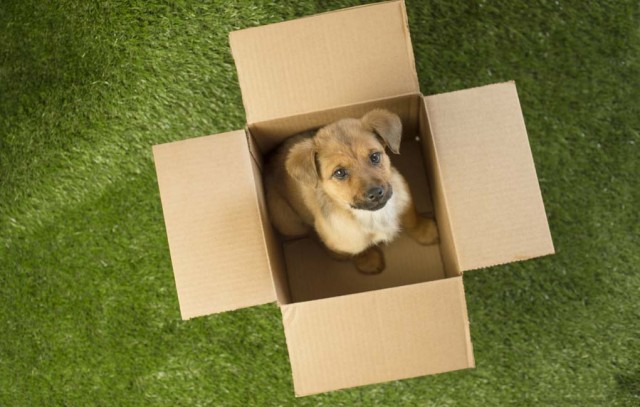
 Summer is over, and we need to start thinking about preparing our dogs for cold weather. This is also a popular time of year for families to adopt a dog. Now that summer fun is over and the kids are back in school, families are settling back into a routine, and their schedules are slowing down a bit. Many people put off adopting dogs in the summer because they are just too busy. Adoption is always the best choice, but if you're interested in buying a puppy, there are some things you should know about pet stores.
Summer is over, and we need to start thinking about preparing our dogs for cold weather. This is also a popular time of year for families to adopt a dog. Now that summer fun is over and the kids are back in school, families are settling back into a routine, and their schedules are slowing down a bit. Many people put off adopting dogs in the summer because they are just too busy. Adoption is always the best choice, but if you're interested in buying a puppy, there are some things you should know about pet stores.
I highly encourage anyone who thinks they may want to purchase their new puppy at a pet store to reconsider that decision. We all know the pros and cons of pet adoption, but stopping by your local shelter or rescue organization to ask a few questions may help you understand the importance of adoption and the benefits that it offers.
If you still think that you'd like to buy a puppy, a responsible breeder would be a better option than a pet store. You can check into the background of a breeder and find information about the pups they have bred in the past very easily. Trying to uncover the reputation of a pet store may be much more difficult.
If you're just not sure where to start looking for a dog, I can understand that a pet store would seem like the most logical and convenient choice. However, after taking a closer look, I think you'll see that there are much better options out there. If you need some advice on where to buy a puppy, we have a great article about responsible adoption, and so does the Humane Society of the United States.
This article gives a very quick rundown of all the options you'll have for buying a puppy. It also explains the dangers of buying puppies from irresponsible breeders or pet stores.
- Once you've decided you're ready for a dog, the next big decision is where to find this lifelong family member. You'll want to make sure not to get an animal from a puppy mill, and that's not always easy to recognize. Sadly, there are some places that seem like great puppy sources that may not be!
The New Rattitude Rat Terrier Rescue blog explains the difference between buying your pet from a breeder or pet store, rescuing a dog from a shelter or rescue organization, or adopting a dog from the “Free to Good Home” ads in the local paper.
- If the people giving away their dog on Craig's List tell you how well-behaved the dog is, can you trust them? Or are they so anxious to get rid of the dog that they'll mislead you or hold back important information? If a pet store or breeder is selling you a dog, will their profit motive keep them from being completely candid and straightforward? Does a shelter worker, faced with overcrowded conditions, have an inducement to skew the facts in hopes of saving a dog's life? In all of these circumstances, a touch of skepticism on your part is probably warranted and may help you ask the right questions and not rely too heavily on information that might not be accurate.
Many people think that pet store puppies look sad inside their cages and they need someone to “rescue” them. BestFriends.org has a great blog that discusses why you shouldn't rescue these animals. You may actually be doing more harm than good in the long run.
- Every puppy sold means more puppies will be ordered. Pet stores operate like any other retail business; they have inventory, and puppies are part of that inventory. If you walk into a store and see a sad-looking dachshund puppy and decide to buy her to get her out of the store, the store places an order for another dachshund puppy. Your kind-hearted gesture of purchasing pet store puppies is interpreted by the store as a demand for that breed. Without intending to do so, you’ve helped keep another commercial breeder, broker, and pet store in business.
Not all pet stores support puppy mills, but there are enough of them that do to give them all a bad name. If you're not familiar with the puppy mills business, you can check out this article on the paws.org website. It explains what puppy mills are, why they are dangerous, and the long-term effects that this type of breeding can have on the dogs.
The article is well-written and very easy to read. It will be a great start to your research if you aren't sure where to begin.
- Puppy mills are commercial breeding facilities that mass-produce dogs (and cats in cat mills) for sale through pet stores or directly to consumers through classified ads or the Internet. Roughly 90 percent of puppies in pet stores come from puppy mills.
One of the things that attract people to pet store puppies is the paperwork and documentation that usually comes with the pups. These papers don't always mean what pet parents believe that they mean. Sometimes, they aren't even real. Angels on Wheels Animal Rescue explains it nicely in this blog by Catherine M. Sheeter.
- Most pet shops would like you to believe that if a puppy is registered by the American Kennel Club, this guarantees the puppy will be healthy and a good example of the breed. This is not so. The only thing that AKC papers certify is that the puppy is purebred and produced by AKC-registered parents. Even this can be fiction, as some producers register more puppies than are actually born in each litter to receive extra registration slips to pass out with unregisterable puppies.
Irresponsible breeders and pet shop owners use a lot of different tricks to make potential pet parents believe their puppies are going to grow into happy, healthy dogs. If a breeder or pet store owner is licensed or has permits of any kind, be sure to look into the organization where those certifications came from.
As this article from salon.com explains:
- The tagline “USDA licensed breeder” sounds pretty official, doesn’t it? The truth is, it doesn’t hold much weight. U.S. federal law under the Animal Welfare Act allows breeders to keep animals in cages with wire flooring that are stacked on top of each other. It also lets them breed females continuously with little to no break between litters. So, a “USDA licensed breeder” in the window doesn’t indicate much about where the animals actually come from or how they’re being treated.
It's not just the fact that they may come from pet stores that should keep you from purchasing pet store puppies. Often, these pups don't get the time and attention they need. They may have people stopping in to snuggle and visit them during business hours, but what happens after the store closes? Do you think someone stays overnight to give the puppies attention?
Chances are the pet store probably closes between 6 and 8 p.m. They also probably don't open until 8 or 9 a.m. That means that for more than 12 hours per day, those puppies are left alone in their individual kennels with no contact from humans or other dogs. FriendsofAnimals.org offers some great information about the detrimental social effects that pet stores can have on puppies.
- Pet shop owners try to keep veterinary bills and other animal care expenses down to maximize profits. Puppies rarely get the attention they need to become well-adjusted. Since they are not properly socialized, they are often returned or dropped at a shelter when problems are detected.
Studies have been done to measure the negative effects on pet store puppies. This article from Decoded Science describes the findings of one such study:
- The results of a recent retrospective study will not surprise anyone who has ever worked in the veterinary, animal behaviorist, or dog training fields. The finding? Pet store puppies are at much higher risk for developing problem behaviors, including aggression toward their owner and/or other dogs, increased fearfulness and sensitivity to touch, and separation-related problems, than dogs raised by non-commercial breeders.
The first study of this kind was conducted by researchers at the University of Pennsylvania's School of Veterinary Medicine. These researchers also found evidence that puppies bought from pet stores do show an increased risk for behavioral problems later in life. The paper was published in the Journal of the American Veterinary Medical Association.
The Penn Current, an online newspaper from the University, published an article that explains the study's findings. Interest in the study was sparked after a 2011 study showed that there was a greater chance of dogs rescued from commercial breeding facilities developing psychological problems than puppies bred by responsible breeders with small breeding businesses. Researchers wanted to see if the same was true for pet store puppies.
The results were astounding:
- “The results are pretty dramatic,” McMillian says. “The problems span so many different types of behaviors, and the differences are rather extreme for some of the behaviors.” Not only did pet store puppies fare worse in 12 of 14 behavioral variables measured, but they did not score better on any measure. “I wasn’t expecting the effects to be so across-the-board bad,” Serpell says.
Purchasing a puppy from a pet store is never a good decision. Some pet stores, like Petco, partner with local shelters. They have animals in their store who are up for adoption. You can adopt them from the pet store, but the adoption actually goes through the shelter or rescue organization where the animal came from. The money paid for the adoption fee also goes back to the organization.
Adoption is always the best option. If adoption won't work for your family, look for a reputable, responsible breeder. It won't be as convenient as purchasing from your local pet store, but it will be better for you and the dog in the long run. Quality local pet stores don't sell animals – they sell merchandise.
Related Articles












